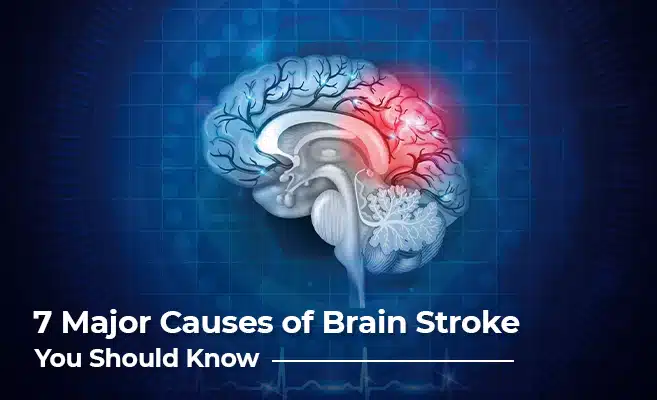Top 7 Causes of a Brain Stroke – Major Risk Factors and Prevention

A stroke, also known as a brain attack, occurs when blood flow to the brain is interrupted. The brain requires a steady supply of oxygen and nutrients to function properly. However, if blood flow is interrupted for even a brief time, this might lead to complications. Without blood or oxygen, brain cells begin to die in seconds. This is just a small piece about brain stroke. Below you will find detailed information on brain stroke causes, factors and prevention.
Brain function is lost when brain cells die. You might not be able to perform effects controlled by that area of your brain.
A stroke, for example, may affect your capacity to:
- Move
- Speak
- Eat
- Think and Remember
- Maintain control over your bowel and bladder.
- Keep your emotions under check.
- Controlling other essential bodily processes
- A stroke can occur at any moment and to anybody.
Types of Strokes
A stroke can happen in two primary ways: Something restricts blood flow, or something causes bleeding in the brain.
Ischemic stroke
A blood artery that transports blood to your brain becomes clogged. It occurs when fatty deposits in arteries rupture and migrate to the brain or when inadequate blood flow caused by an irregular heartbeat generates a blood clot.
Hemorrhagic stroke
It is less common than an ischemic stroke, but it can be more severe. A blood vessel in your brain expands and bursts, or a weak one leaks. This type of stroke can be caused by uncontrolled high blood pressure and too much blood thinner medication.
Brain Stroke Causes
Some disorders that increase your risk of having a brain stroke can be treated. Brain Stroke factors that lead to the risk are unchangeable:
1. High blood pressure
Your doctor may diagnose you with hypertension. It is the leading cause of strokes. Your doctor will determine treatment options with you if your blood pressure is normally 130/80 or above.
2. Heart disease
This disorder involves faulty cardiac valves and atrial fibrillation, or irregular heartbeat, which accounts for one-quarter of all strokes in the elderly. Fatty deposits can also cause obstructed arteries.
3. Diabetes
People who have it are more prone to high blood pressure and be overweight. Both increase the likelihood of having a stroke. Diabetes affects your blood arteries, increasing your risk of having a stroke. When you have a stroke, and your blood sugar levels are high, your brain suffers more damage.
4. Weight and exercise
If you are overweight, your chances of having a stroke increase. Working on exercise every day might help you decrease your chances. Take a 30-minute brisk walk or practice muscle-strengthening activities like pushups and weight lifting.
5. Tobacco
Smoking or chewing it increases your chances of having a stroke. Nicotine raises your blood pressure. Cigarette smoking promotes an accumulation of fat in your primary neck artery. It also thickens your blood, making it more prone to clotting. Even secondhand smoking might have an impact on you.
6. Family
Strokes can be passed on via families. You and your family members may be predisposed to high blood pressure or diabetes. Some strokes are caused by a hereditary condition that restricts blood flow to the brain.
7. Medications
Some medications might increase your risk of having a stroke. Blood-thinning medicines, for example, which doctors recommend avoiding blood clots, can occasionally increase the risk of a stroke by causing bleeding. Hormone treatment, which is used to treat menopausal symptoms such as hot flashes, has been related to an increased risk of stroke. Low-dose osteogeny in birth control tablets may also increase your chances.
Brain Stoke Preventions
You are more likely to suffer a stroke if you are older and have a family history of strokes. So, what can you do to improve your chances? Here are brain stroke preventions you should know:
Lower Your Blood Pressure
If not properly managed, high blood pressure can make you 4-6 times more likely to have a stroke. This is because it can thicken the artery walls, causing cholesterol or other lipids to pile up and create plaques. If one of them escapes, it has the potential to cut off your brain’s blood supply.
Stay Away From Smoking
Tobacco usage doubles your chance of having a stroke. Cigarette nicotine elevates blood pressure, while carbon monoxide in smoking reduces the quantity of oxygen your blood can carry. Even inhaling secondhand smoke might increase your risk of having a stroke.
Control Your Diabetes
High blood sugar levels might increase your chances of having a stroke by 2-4 times. Diabetes, if not well treated, can cause fatty deposits or blood clots inside your blood vessels. This can cause the ones in your brain and spine to constrict, potentially cutting off blood circulation to the brain.
Eat Better Foods
Healthy eating can help you lose weight and reduce your chance of having a stroke. Every day, eat plenty of fresh fruits and vegetables. Choose meals strong in fibre and lean proteins. Trans and saturated fats should be avoided, which can block your arteries. Reduce your salt intake and avoid processed meals. They’re frequently high in salt, elevating blood pressure and trans fats.
Exercise
Being a lazy slob can result in obesity, high cholesterol, diabetes, and high blood pressure, which are risk factors for stroke. So get to work. You are not required to run a mile. It is sufficient to work out for 30 minutes five days a week. You should work hard to make you huff and puff, but not too much. Before you begin exercising, consult with your doctor.
Conclusion
So, this was all about brain stroke, its causes, factors and preventions. Hope you are now well aware of it. You should take care of yourself and prevent yourself from this disease.

 Book An Appointment
Book An Appointment Virtual Consultation
Virtual Consultation





